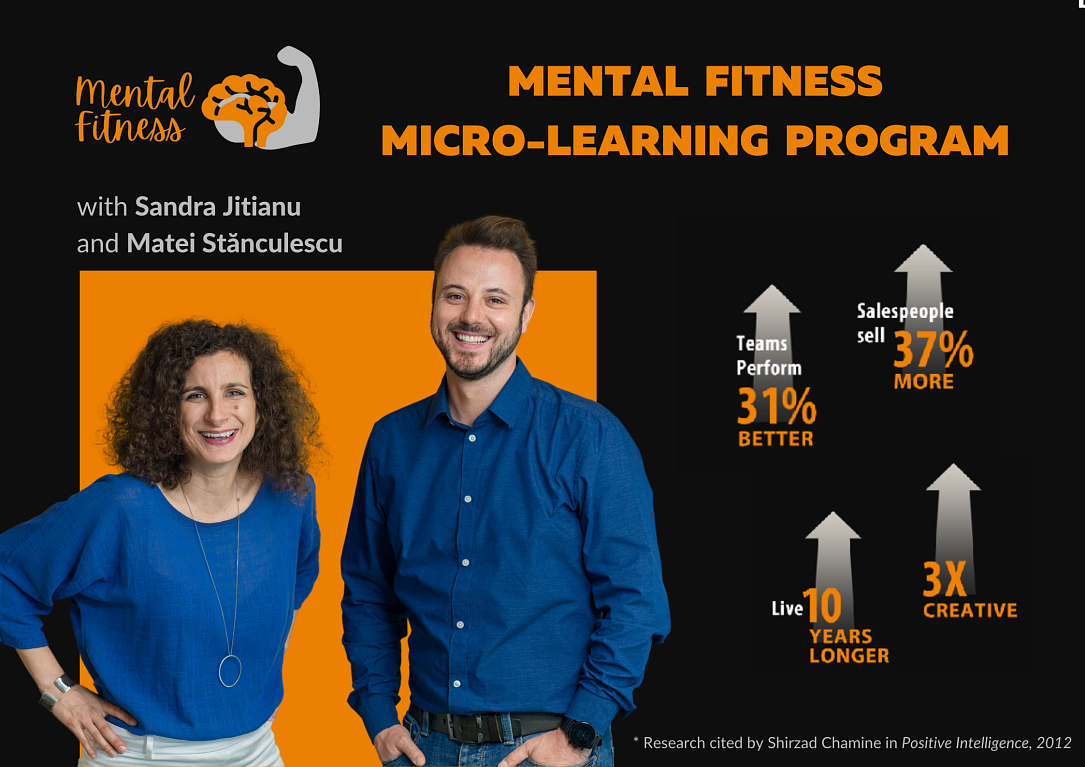(P) When Taking Decisions, Mental Fitness is the X-Factor. New program for leaders now available in Romania



A leader’s life has not grown easier over the past roller-coaster year: pressure on results is still there despite the growing ambiguity, disruption in how we interact socially, and the resultant soaring levels of anxiety. They need to constantly think how to adapt ways of working, how to redefine processes to keep up the pace, and how to integrate the new tools that promise increases in productivity. The disruption in social interaction has driven down the level of trust, team vibe has withered, people no longer learn from each other the way they did before.
How are you as a leader supposed to weather these unwelcome variations while keeping calm and making the right choices for your business and teams? It turns out that what happens out there is only half of the story. What we tell ourselves about it is the other half - and it often is a stronger predictor of our behavior than the situation itself.
When getting angry over a situation how often did it happen that your emotions got carried over to the next situation you were involved in, causing you to overreact? And have you noticed we usually see more optimistic prospects when we are in a good mood and vice-versa? Judgment is often impacted by mood and many psychological scientists now assume that emotions are the dominant driver of most meaningful decisions in life.
Emotions shape decisions, as a team of researchers from Harvard and three other prestigious universities summed up 35 years of work on emotions and decision making. (Emotion and Decision Making, Jennifer S. Lerner, Ye Li, Piercarlo Valdesolo, Karim S. Kassam, Annual Review of Psychology 2015 66:1, 799-823).
What if you could voluntarily activate or reduce your affective, mental, and behavioral responses in order to pursue a goal? This is what self-regulation is all about. It puts you in the driver seat.
The good news is that self-regulation is a learnable process.
One way to achieve this skill is to train your positive mental ‘muscles’ and have them activated before taking a difficult decision. Think of athletes getting ready for a workout or competition: they will always warm up their muscles before that. People will typically react from the part of the brain that is more ‘fired up’. When encountering a stressful situation with those positive neural connections activated there is a bigger probability that we will act from a place of clarity and wisdom.
How to ‘warm up’ our mind and regulate our reactions to respond to challenges in a clear-headed and balanced way? This is precisely what Shirzad Chamine, a New York Times bestselling author, researcher and Stanford University lecturer has studied. His internationally acclaimed Positive Intelligence program has helped thousands of CEOs and world-class athletes improve their results, deal with their impostor syndrome, and have better relationships.
This game-changing Positive Intelligence program taken by companies like P&G, Amazon, CBS, Google and Facebook is now accessible in Romania, too.
“Knowing how to work with one’s well disguised mental saboteurs, becoming aware before an unwanted automatic reaction hijacks you are essential skills that can be developed. And six to seven weeks of applied practice are enough to lay out new neural pathways and build up those habits that will allow you to act in a centered and focused frame of mind” says Sandra Jitianu, who co-founded Mental Fitness Romania together with Matei Stanculescu. Both of them are graduates of the 1st coach cohort trained by Shirzad Chamine. They made the program available in Romanian and added new tools to serve the specific needs of leaders.
“The micro-learning program that we are now running both in Romanian and in English is like an intensive mental and emotional bootcamp. The learning journey includes goal setting, coach-guided exploration sessions, mental rehearsal for changing routines, and full support throughout the program”, Sandra adds.
“Leaders, now more than ever, feel a greater need for mental and emotional wellbeing on their team while having less time and resources”, explains Matei. “With the right set of tools they can navigate this complexity while maintaining the clarity and sharpness of their mind. Our program is extremely easy to follow due to its digital accessibility and self-paced rhythm. It’s designed to run 100% online while also keeping personal interactions present. Participants can train with a smartphone app available exclusively to them, keeping the motivation for practicing the new routines they want to acquire.”
What’s in it for you?
According to research, within 6-8 weeks of starting the mental fitness practice MRI scans show:
In terms of competencies improvement at corporate level, studies have shown breakthrough results in outperforming sales, improved productivity, company profit growth:
50 people from business, science and creative backgrounds have gone through the program led by Matei and Sandra since they launched it in 2020. Groups include international participants in Germany, France and the UK.
Here’s what graduates in Romania are saying about the impact of the program in their personal and professional lives:
‘’This program helped me gain a new perspective about how my mind works and gave me access to some handy tools. I now have a set of new routines in my day-to-day life”, M. Banu, CEO, Orkla Foods Romania
‘‘It's like I've rediscovered myself and my job. I now know how to bring things to completion, and I appreciate myself more”, M. Voicu, CFO, Imprimeria Arta Grafica
‘‘I became calmer and more accommodating. I got better at organizing my professional activity, giving more credit to those around me and discovering more opportunities”, Romanița Iovan, Fashion designer
More details about this 7-week tech-enabled, mobile learning program can be found on the Mental Fitness Romania website.